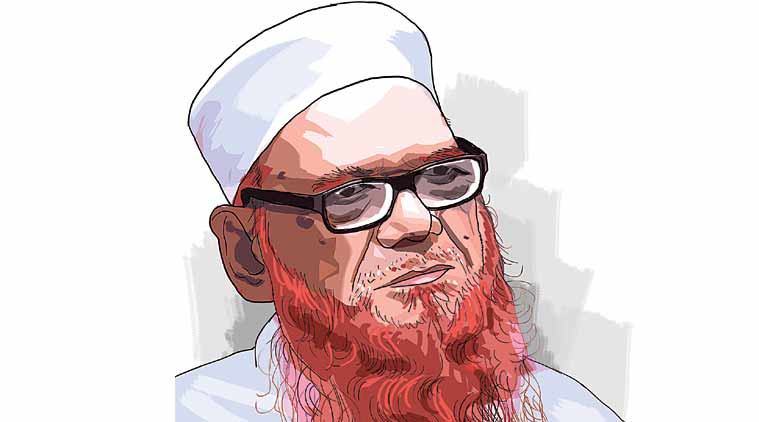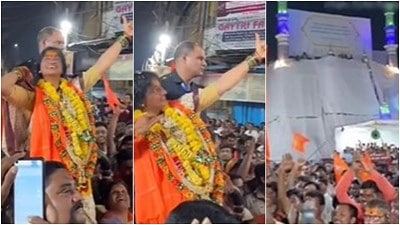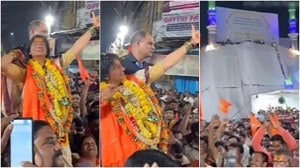- India
- International
Confessions that didn’t work: How the cases against Tunda collapsed
Hakimji, Babaji, Abdul Quddus and Tunda. These are the names that Abdul Karim, the 73-year-old with flowing, henna-dyed beard, was referred to by his associates. The alleged Lashkar-e-Toiba (LeT) “bomb expert” was accused of conspiring to carry out a string of bombings following the Babri demolition of 1992. After his arrest from the India-Nepal border […]
 Abdul Karim Tunda. (Illustration: C R Sasikumar)
Abdul Karim Tunda. (Illustration: C R Sasikumar)
Hakimji, Babaji, Abdul Quddus and Tunda. These are the names that Abdul Karim, the 73-year-old with flowing, henna-dyed beard, was referred to by his associates. The alleged Lashkar-e-Toiba (LeT) “bomb expert” was accused of conspiring to carry out a string of bombings following the Babri demolition of 1992. After his arrest from the India-Nepal border on August 16, 2013, the Special Cell of Delhi Police lodged as many 20 cases against him, and filed four chargesheets. On Saturday, the trial court gave Tunda a clean chit in the last remaining case after the Special Cell failed to produce any legally admissible evidence to put him on trial. It has now moved the Supreme Court in one case, in which Tunda was charged under TADA.
A summary of the Special Cell’s charges, and the trial court’s response:
Case 1: 1994 R-Day blast plan
Tunda was cleared on March 10, 2015 in the case in which the Special Cell had chargesheeted him under Sections 3 and 5 of TADA, sections of the Explosive Substances Act (ESA), and criminal conspiracy under the IPC. In 1999, a Delhi court had convicted Tunda’s brother Abdul Haq, his brother-in-law Aftab, and three others under ESA and of criminal conspiracy. But they were acquitted of TADA charges. The Special Cell had arrested all five on January 17, 1994, and claimed to have recovered 150 kg of explosives and six daggers. After Tunda was arrested, the Cell had charged him in this case.
Prosecution case: The Cell alleged the accused had made “confessional statements”, in which they “clearly explained” the pivotal role that Tunda played in procuring explosives to carry out a blast on Republic Day in 1994. It also relied on the statement of one Ram Sudhar Yadav, the owner of a chemical shop, who said Tunda used to purchase chemicals from his shop, and on the confessional statements of Tunda himself.
[related-post]
What court said: It held that confessions of the co-accused could be “read against” Tunda only if they had been “charged and tried together”, as provided in the proviso to Section 15 of TADA. “In the present case, neither the present accused was charged nor tried along with other co-accused. Thus, bare confessional statements of co-accused are not admissible against the present accused,” the TADA court said.

On the Cell’s reliance on the confessional statement of the owner of the chemical shop, the court said it was “highly improbable” that anyone would be able to recognise someone who had visited their shop back in 1994, and that his evidence was not “believable”.
“In fact, the introduction of this witness shows the desperation on the part of the prosecution to somehow create some evidence when there exists none,” the court said.
Case 2: 1997 Karol Bagh blast
The second discharge came on April 23, 2015. The Cell had chargesheeted Tunda for murder, attempt to murder and criminal conspiracy under the IPC and ESA in connection with the blast in Delhi’s Karol Bagh on October 28, 1997, for which Amir Khan and Mohammed Shakeel were arrested. Shakeel was discharged in 1998; however, Khan was convicted in 2003. In 2006, Delhi High Court cleared Khan. Based on Khan’s alleged disclosures, Tunda was chargesheeted after his arrest in 2013.
Prosecution’s case: The Cell said Khan had disclosed that “he was associated” with Tunda, and had “planted the bomb on his instance”. The Cell also relied upon the statement of Shakeel, and further claimed that Tunda had in a disclosure statement on September 28, 2013, said he was “associated” with Khan and Shakeel. “Charges should be framed against Tunda on the basis of disclosure statements of co-accused Md. Shakeel and Amir Khan and of the accused Tunda,” the Cell had argued.
What court said: That besides the disclosure statements, “there is no other material placed on record with the charge sheet”. Referring to Section 30 of the Evidence Act, it said that “even if” the confessional statements of Khan and Shakeel were “admissible” in the case as the two person were not “jointly tried” with Tunda, the confession of a co-accused “cannot be treated as substantive evidence”. On the disclosure statement of Tunda, the court said: “These disclosure statements are inadmissible in evidence as they have been made to a police official and thus barred under Section 25 of the Evidence Act.”
Case 3: 1997 Sadar Bazar blasts
The third discharge came on April 23, 2015 — in connection with the blast in Sadar Bazar during the Maharaja Agrasen Jayanti procession, and an explosion that took place on a truck on Qutab Road . The police had arrested Khan and Shakeel in the case. In 1999, Shakeel was discharged, and in 2001, Khan was acquitted of charges of attempt to murder, criminal conspiracy and sections of ESA. After Tunda’s arrest, based on the disclosure statement of Khan, he was chargesheeted in the Sadar Bazar case.
Prosecution’s case: The Special cell presented the same argument as in the Karol Bagh case.
What court said: The court too dismissed the argument on similar grounds. “The disclosure statements of the accused Md. Shakeel and Amir Khan are inadmissible in evidence… Apart from the disclosure statement of accused Abdul Karim @ Tunda there is no other material… which could implicate him…,” the court said.
Case 4: 1997 Infiltration bid
On Saturday, the court cleared Tunda, his father-in-law, and their two alleged aides, Allauddin and Bashiruddin, accused of helping Pakistani and Bangladeshi terrorists infiltrate to carry out terror strikes. While the detailed order is awaited, the court said it had discharged the accused for lack of evidence.
The Special Cell had charged the four for alleged offences under various sections of IPC, including 121 (waging war against the country), 121-A (conspiring to commit certain offences against the state) and under provisions of the ESA, Foreigners Act and Arms Act.
More Explained
EXPRESS OPINION
Apr 18: Latest News
- 01
- 02
- 03
- 04
- 05








































